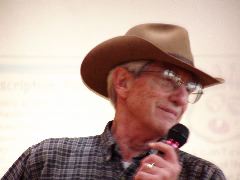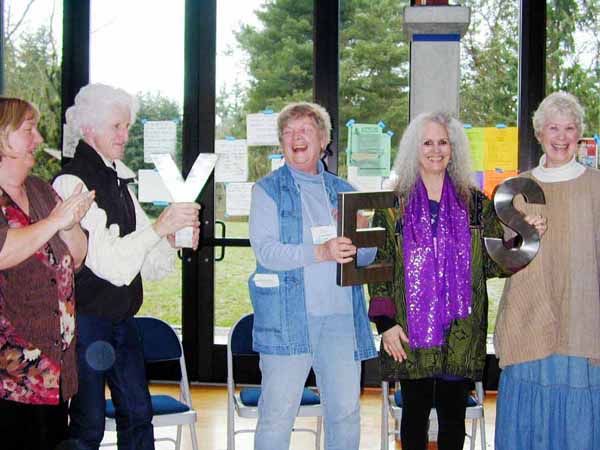When I ran a session last year at the International Conference on Complex Systems, I was struck by a practice followed by most of the presenters. They acknowledged the people who had influenced their work.
I’m just finishing a wonderful book that I got at the conference: Complexity: A Guided Tour by Melanie Mitchell. It’s a terrific overview, looking across multiple disciplines – computation, evolution, genetics, networks and more. Like the conference presenters, Mitchell included photos of thought leaders as she introduced their ideas.
I am inspired by this custom of honoring those who influence you!
So as I return to my blog after a crazy, wonderful, hectic year of sharing the ideas from the award-winning Engaging Emergence: Turning Upheaval into Opportunity, I thought I’d begin with a thanks to those who have most influenced my work:
- Anne Stadler and the Spirited Work Community,
- And Harrison Owen, creator of Open Space Technology.

Spirited Work was an Open Space learning community of practice that met quarterly from 1998 to 2004 to explore the intersection of being and doing – spirit and work. Anne Stadler cooked up the idea of Spirited Work. It became our playground for learning about emergence in human systems, among many lessons. It continues to inform our work and our friendship years later.
The form at the heart Spirited Work – Open Space Technology – was created by Harrison Owen. Harrison introduced me to Anne – one of the many gifts for which I am grateful. Beyond the intro to Anne and Open Space Technology, Harrison’s friendship has brought with it his lifetime of learning about chaos and order. My first taste came during an Open Space Technology workshop that I did with Harrison in 1999. As participants were off in breakout sessions, Harrison told me of his Ph.D. research into chaos and order. He spoke of the contradictory images of an immanent and a transcendent G-d in the Old Testament. I remember the question said he was researching: if the best and the brightest of the time created this holy book, what was their purpose in introducing so much contradiction?
His stories about pursing that question, not to mention the power of the question itself, influenced me more than I can put into words. Through the years of making sense of why Open Space works, that use of the language of spirit coupled with an explanation based in complexity science helped me to recognize that these were simply two ways of pointing into the same territory.
When I talk about the gifts I’ve received from knowing Harrison and from Open Space, I often share some lessons that I took away early on:
- Generosity of spirit. Harrison opted not to copyright or trademark the process. Instead, he made it clear that Open Space is free for the taking. The only responsibility is to give back, to share what you learn.
- Focus on essence. While it is easy to get wrapped up in the complexity of any situation, Harrison has a talent for attending to what matters most. All the rest is details.
- Simplicity of design. I’ve called Harrison a master of laziness, always finding the path of the least effort for the greatest outcome. I love the power of a question he always poses: What’s one less thing to do? To which I add: and still be whole and complete?
- Inclusion/invitation. The stories Harrison tells of welcoming the stranger makes it exquisitely clear that both the stranger within and from outside bring gifts, no matter how they how they show up.
So I open this year on my blog with gratitude to Spirited Work, Anne Stadler, and Harrison Owen!


